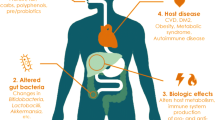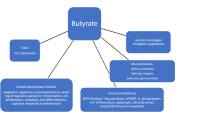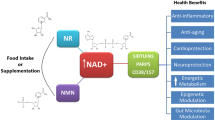Abstract
Dietary fiber has beneficial effects on obesity-related diseases and gut microbiota, contributing a key role in the interaction between dietary metabolism and host metabolism. Our objective was to investigate the cause of the improvement in multiple types of physiological states with seaweed Undaria pinnatifida treatment on high-fat diet-fed mice and to evaluate whether its consequent anti-adiposity and anti-hyperlipidemic effects are associated with gut microbiota and its metabolomics regulation. U. pinnatifida administration in our experiment was shown to significantly decrease high-fat diet-induced body weight gain, as well as epididymal and abdominal adiposity. U. pinnatifida intake also significantly reduced liver weight and serum triacylglycerol accumulation. We also found that improving effects of U. pinnatifida on high-fat diet-induced metabolic dysfunctions were associated with significant increase in specific bacteria, such as Bacteroides acidifaciens and Bacteroides ovatus, as well as metabolites, including short-chain fatty acids and tricarboxylic acid cycle intermediates. Our result provides a cheap dietary strategy to host metabolism improvement and obesity management.
Key points
• U. pinnatifida improved adipose accumulation and lipid metabolism.
• B. acidifaciens and B. ovatus contributed to the beneficial effects of U. pinnatifida.
• SCFAs and TCA cycle intermediates were critical to the metabolic outcomes.
• Our study provides a cheap dietary strategy for obesity management.









Similar content being viewed by others
References
Anhe FF, Nachbar RT, Varin TV, Vilela V, Dudonne S, Pilon G, Fournier M, Lecours MA, Desjardins Y, Roy D, Levy E, Marette A (2017) A polyphenol-rich cranberry extract reverses insulin resistance and hepatic steatosis independently of body weight loss. Mol Metab 6(12):1563–1573. https://doi.org/10.1016/j.molmet.2017.10.003
Bai L, Gao M, Cheng X, Kang G, Huang H (2020) Engineered butyrate-producing bacteria prevents high fat diet-induced obesity in mice. Microb Cell Factories 19(1):94. https://doi.org/10.1186/s12934-020-01350-z
Bell JA, Carslake D, O’Keeffe LM, Frysz M, Howe LD, Hamer M, Wade KH, Timpson NJ, Smith GD (2018) Associations of body mass and fat indexes with cardiometabolic traits. J Am Coll Cardiol 72(24):3142–3154. https://doi.org/10.1016/j.jacc.2018.09.066
Bianchi F, Duque ALRF, Saad SMI, Sivieri K (2019) Gut microbiome approaches to treat obesity in humans. Appl Microbiol Biotechnol 103(3):1081–1094. https://doi.org/10.1007/s00253-018-9570-8
Burney M, Mathew L, Gaikwad A, Nugent EK, Gonzalez AO, Smith JA (2018) Evaluation fucoidan extracts from Undaria pinnatifida and Fucus vesiculosus in combination with anticancer drugs in human cancer orthotopic mouse models. Integr Cancer Ther 17(3):755–761. https://doi.org/10.1177/1534735417740631
Conte MP, Schippa S, Zamboni I, Penta M, Chiarini F, Seganti L, Osborn J, Falconieri P, Borrelli O, Cucchiara S (2006) Gut-associated bacterial microbiota in paediatric patients with inflammatory bowel disease. Gut 55(12):1760–1767. https://doi.org/10.1136/gut.2005.078824
Dawczynski C, Schubert R, Jahreis G (2007) Amino acids, fatty acids, and dietary fibre in edible seaweed products. Food Chem 103(3):891–899. https://doi.org/10.1016/j.foodchem.2006.09.041
De Vadder F, Kovatcheva-Datchary P, Goncalves D, Vinera J, Zitoun C, Duchampt A, Backhed F, Mithieux G (2014) Microbiota-generated metabolites promote metabolic benefits via gut-brain neural circuits. Cell 156(1-2):84–96. https://doi.org/10.1016/j.cell.2013.12.016
Deehan EC, Walter J (2016) The fiber gap and the disappearing gut microbiome: implications for human nutrition. Trends Endocrin Met:S1043276016000357. https://doi.org/10.1016/j.tem.2016.03.001
den Besten G, Bleeker A, Gerding A, van Eunen K, Havinga R, van Dijk TH, Oosterveer MH, Jonker JW, Groen AK, Reijngoud DJ, Bakker BM (2015) Short-chain fatty acids protect against high-fat diet-induced obesity via a PPAR-dependent switch from lipogenesis to fat oxidation. Diabetes 64(7):2398–2408. https://doi.org/10.2337/db14-1213
Han F, Wang Y, Han Y, Zhao J, Han F, Song G, Jiang P, Miao H (2018) Effects of whole-grain rice and wheat on composition of gut microbiota and short-chain fatty acids in rats. J Agric Food Chem 66(25):6326–6335. https://doi.org/10.1021/acs.jafc.8b01891
Hooper LV, Littman DR, Macpherson AJ (2012) Interactions between the microbiota and the immune system. Science 336(6086):1268–1273. https://doi.org/10.1126/science.1223490
Jiao X, Wang Y, Lin Y, Lang Y, Li E, Zhang X, Zhang Q, Feng Y, Meng X, Li B (2019) Blueberry polyphenols extract as a potential prebiotic with anti-obesity effects on C57BL/6 J mice by modulating the gut microbiota. J Nutr Biochem 64:88–100. https://doi.org/10.1016/j.jnutbio.2018.07.008
Kai Z, Matthew HJ, Sanghee P, Donghai Z, Jones TE, Pories WJ, Hornby PJ, Lenhard J, Lynis Dohm G, Houmard JA (2019) Altered tricarboxylic acid cycle flux in primary myotubes from severely obese humans. Int J Obes 43:895–905. https://doi.org/10.1038/s41366-018-0137-7
Karpe F, Pinnick KE (2015) Biology of upper-body and lower-body adipose tissue-link to whole-body phenotypes. Nat Rev Endocrinol 11(2):90–100. https://doi.org/10.1038/nrendo.2014.185
Koh A, De Vadder F, Kovatcheva-Datchary P, Backhed F (2016) From dietary fiber to host physiology: short-chain fatty acids as key bacterial metabolites. Cell 165(6):1332–1345. https://doi.org/10.1016/j.cell.2016.05.041
Li XX, Dong SF, Liu HW (2010) Analysis and evaluation on nutritious componentes of Undaria pinnatifida in Yantai sea area. J Anhui Agric Sci 38(33):18768–18769. https://doi.org/10.13989/j.cnki.0517-6611.2010.33.153 (Chinese)
Li LL, Wang YT, Zhu LM, Liu ZY, Ye CQ, Qin S (2020) Inulin with different degrees of polymerization protects against diet-induced endotoxemia and inflammation in association with gut microbiota regulation in mice. Sci Rep 10(1):978. https://doi.org/10.1038/s41598-020-58048-w
Lin T-L, Shu C-C, Lai W-F, Tzeng C-M, Lai H-C, Lu C-C (2019) Investiture of next generation probiotics on amelioration of diseases–strains do matter. Med Microecol:1–2. https://doi.org/10.1016/j.medmic.2019.100002
Lv J, Jia YT, Li J, Kuai WT, Li Y, Guo F, Xu XJ, Zhao ZL, Lv J, Li ZX (2019) Gegen Qinlian decoction enhances the effect of PD-1 blockade in colorectal cancer with microsatellite stability by remodelling the gut microbiota and the tumour microenvironment. Cell Death Dis 10:415. https://doi.org/10.1038/s41419-019-1638-6
Makki K, Deehan EC, Walter J, Bäckhed F (2018) The impact of dietary fiber on gut microbiota in host health and disease. Cell Host Microbe 23(6):705–715. https://doi.org/10.1016/j.chom.2018.05.012
Mancusso R, Gregorio GG, Liu Q, Wang D-N (2012) Structure and mechanism of a bacterial sodium-dependent dicarboxylate transporter. Nature 491(7425):622–626. https://doi.org/10.1038/nature11542
Marques FZ, Nelson E, Chu PY, Horlock D, Fiedler A, Ziemann M, Tan JK, Kuruppu S, Rajapakse NW, El-Osta A, Mackay CR, Kaye DM (2017) High-fiber diet and acetate supplementation change the gut microbiota and prevent the development of hypertension and heart failure in hypertensive mice. Circulation 135(10):964–977. https://doi.org/10.1161/Circulationaha.116.024545
Martins AR, Crisma AR, Masi LN, Amaral CL, Hirabara SM (2017) Attenuation of obesity and insulin resistance by fish oil supplementation is associated with improved skeletal muscle mitochondrial function in mice fed a high-fat diet. J Nutr Biochem 55:76–88. https://doi.org/10.1016/j.jnutbio.2017.11.012
Menni C, Jackson MA, Pallister T, Steves CJ, Spector TD, Valdes AM (2017) Gut microbiome diversity and high-fibre intake are related to lower long-term weight gain. Int J Obesity:1099–1105. https://doi.org/10.1038/ijo.2017.66
Miyamoto Y, Itoh K (2000) Bacteroides acidifaciens sp, nov., isolated from the caecum of mice. Int J Syst Evol Microbiol 50:145–148. https://doi.org/10.1099/00207713-50-1-145
Mozaffarian D, Hao T, Rimm EB, Willett WC, Hu FB (2011) Changes in diet and lifestyle and long-term weight gain in women and men. N Engl J Med 364(25):2392–2404. https://doi.org/10.1056/nejmoa1014296
Noor SO, Ridgway K, Scovell L, Kemsley EK, Lund EK, Jamieson C, Johnson IT, Narbad A (2010) Ulcerative colitis and irritable bowel patients exhibit distinct abnormalities of the gut microbiota. BMC Gastroenterol 10(134):1–9. https://doi.org/10.1186/1471-230x-10-134
Pedersen HK, Gudmundsdottir V, Nielsen HB, Hyotylainen T, Nielsen T, Jensen BAH, Forslund K, Hildebrand F, Prifti E, Falony G, Le Chatelier E, Levenez F, Dore J, Mattila I, Plichta DR, Poho P, Hellgren LI, Arumugam M, Sunagawa S, Vieira-Silva S, Jorgensen T, Holm JB, Trost K, Kristiansen K, Brix S, Raes J, Wang J, Hansen T, Bork P, Brunak S, Oresic M, Ehrlich SD, Pedersen O, Consortium M (2016) Human gut microbes impact host serum metabolome and insulin sensitivity. Nature 535(7612):376–381. https://doi.org/10.1038/nature18646
Peron G, Hidalgo-Liberona N, Gonzalez-Dominguez R, Garcia-Aloy M, Guglielmetti S, Bernardi S, Kirkup B, Kroon PA, Cherubini A, Riso P, Andres-Lacueva C (2020) Exploring the molecular pathways behind the effects of nutrients and dietary polyphenols on gut microbiota and intestinal permeability: a perspective on the potential of metabolomics and future clinical applications. J Agric Food Chem 68(7):1780–1789. https://doi.org/10.1021/acs.jafc.9b01687
Rooks MG, Garrett WS (2016) Gut microbiota, metabolites and host immunity. Nat Rev Immunol 16(6):341–352. https://doi.org/10.1038/nri.2016.42
Samuel BS, Shaito A, Motoike T, Rey FE, Backhed F, Manchester JK, Hammer RE, Williams SC, Crowley J, Yanagisawa M, Gordon JI (2008) Effects of the gut microbiota on host adiposity are modulated by the short-chain fatty-acid binding G protein-coupled receptor, Gpr41. Proc Natl Acad Sci U S A 105(43):16767–16772. https://doi.org/10.1073/pnas.0808567105
Serino M (2019) SCFAs-the thin microbial metabolic line between good and bad. Nat Rev Endocrinol 15(6):318–319. https://doi.org/10.1038/s41574-019-0205-7
South PM, Floerl O, Forrest BM, Thomsen MS (2017) A review of three decades of research on the invasive kelp Undaria pinnatifida in Australasia: an assessment of its success, impacts and status as one of the world’s worst invaders. Mar Environ Res 131:243–257. https://doi.org/10.1016/j.marenvres.2017.09.015
Then CK, Paillas S, Wang X, Hampson A, Kiltie AE (2020) Association of Bacteroides acidifaciens relative abundance with high-fibre diet-associated radiosensitisation. https://doi.org/10.1101/846436
Trompette A, Gollwitzer ES, Yadava K, Sichelstiel AK, Sprenger N, Ngom-Bru C, Blanchard C, Junt T, Nicod LP, Harris NL, Marsland BJ (2014) Gut microbiota metabolism of dietary fiber influences allergic airway disease and hematopoiesis. Nat Med 20(2):159–166. https://doi.org/10.1038/nm.3444
Truax AD, Chen L, Tam JW, Cheng N, Guo H, Koblansky AA, Chou WC, Wilson JE, Brickey WJ, Petrucelli A, Liu R, Cooper DE, Koenigsknecht MJ, Young VB, Netea MG, Stienstra R, Sartor RB, Montgomery SA, Coleman RA, Ting JP (2018) The inhibitory innate immune sensor NLRP12 maintains a threshold against obesity by regulating gut microbiota homeostasis. Cell Host Microbe 24(3):364–378. https://doi.org/10.1016/j.chom.2018.08.009
Turnbaugh PJ, Hamady M, Yatsunenko T, Cantarel BL, Duncan A, Ley RE, Sogin ML, Jones WJ, Roe BA, Affourtit JP, Egholm M, Henrissat B, Heath AC, Knight R, Gordon JI (2009) A core gut microbiome in obese and lean twins. Nature 457(7228):480–U487. https://doi.org/10.1038/nature07540
Vinolo MA, Rodrigues HG, Hatanaka E, Sato FT, Sampaio SC, Curi R (2011) Suppressive effect of short-chain fatty acids on production of proinflammatory mediators by neutrophils. J Nutr Biochem 22(9):849–855. https://doi.org/10.1016/j.jnutbio.2010.07.009
Wan XZ, Ai C, Chen YH, Gao XX, Zhong RT, Liu B, Chen XH, Zhao C (2020) Physicochemical characterization of a polysaccharide from green microalga Chlorella pyrenoidosa and its hypolipidemic activity via gut microbiota regulation in rats. J Agric Food Chem 68(5):1186–1197. https://doi.org/10.1021/acs.jafc.9b06282
Wang L, Park Y-J, Jeon Y-J, Ryu B (2018) Bioactivities of the edible brown seaweed, Undaria pinnatifida: a review. Aquaculture 495(2018):873–880. https://doi.org/10.1016/j.aquaculture.2018.06.079
Wang Y, Li L, Ye C, Yuan J, Qin S (2020) Alginate oligosaccharide improves lipid metabolism and inflammation by modulating gut microbiota in high-fat diet fed mice. Appl Microbiol Biotechnol 104(8):3541–3554. https://doi.org/10.1007/s00253-020-10449-7
Wu J, Li H, Wang X, Zhang X, Liu W, Wang Y, Zhang Y, Pan H, Wang Q, Han Y (2019a) Effect of polysaccharide from Undaria pinnatifida on proliferation, migration and apoptosis of breast cancer cell MCF7. Int J Biol Macromol 2019(121):734–742. https://doi.org/10.1016/j.ijbiomac.2018.10.086
Wu TR, Lin CS, Chang CJ, Lin TL, Martel J, Ko YF, Ojcius DM, Lu CC, Young JD, Lai HC (2019b) Gut commensal Parabacteroides goldsteinii plays a predominant role in the anti-obesity effects of polysaccharides isolated from Hirsutella sinensis. Gut 68(2):248–262. https://doi.org/10.1136/gutjnl-2017-315458
Wu S, Cao G, Adil MF, Tu Y, Wang W, Cai B, Zhao D, Shamsi IH (2020) Changes in water loss and cell wall metabolism during postharvest withering of tobacco (Nicotiana tabacum L.) leaves using tandem mass tag-based quantitative proteomics approach. Plant Physiol Biochem 150:121–132. https://doi.org/10.1016/j.plaphy.2020.02.040
Yang JY, Lee YS, Kim Y, Lee SH, Ryu S, Fukuda S, Hase K, Yang CS, Lim HS, Kim MS, Kim HM, Ahn SH, Kwon BE, Ko HJ, Kweon MN (2017) Gut commensal Bacteroides acidifaciens prevents obesity and improves insulin sensitivity in mice. Mucosal Immunol 10(1):104–116. https://doi.org/10.1038/mi.2016.42
Young A, Gardiner D, Kuksal N, Gill R, O’Brien M, Mailloux RJ (2019) Deletion of the glutaredoxin-2 gene protects mice from diet-induced weight gain, which correlates with increased mitochondrial respiration and proton leaks in skeletal muscle. Antioxid Redox Signal 31(17):1272–1288. https://doi.org/10.1089/ars.2018.7715
Yu YY, Zhang YJ, Hu CB, Zou XY, Lin Y, Xia YY, You LJ (2019) Chemistry and immunostimulatory activity of a polysaccharide from Undaria pinnatifida. Food Chem Toxicol 128:119–128. https://doi.org/10.1016/j.fct.2019.03.042
Zeng SL, Li SZ, Xiao PT, Cai YY, Chu C, Chen BZ, Li P, Li J, Liu EH (2020) Citrus polymethoxyflavones attenuate metabolic syndrome by regulating gut microbiome and amino acid metabolism. Sci Adv 6(1):1–13. https://doi.org/10.1126/sciadv.aax6208
Zhai S, Qin S, Li L, Zhu L, Zou Z, Wang L (2019) Dietary butyrate suppresses inflammation through modulating gut microbiota in high-fat diet-fed mice. FEMS Microbiol Lett 366(13). https://doi.org/10.1093/femsle/fnz153
Zhao LP, Zhang F, Ding XY, Wu GJ, Lam YY, Wang XJ, Fu HQ, Xue XH, Lu CH, Ma JL, Yu LH, Xu CM, Ren ZY, Xu Y, Xu SM, Shen HL, Zhu XL, Shi Y, Shen QY, Dong WP, Liu R, Ling YX, Zeng Y, Wang XP, Zhang QP, Wang J, Wang LH, Wu YQ, Zeng BH, Wei H, Zhang MH, Peng YD, Zhang CH (2018) Gut bacteria selectively promoted by dietary fibers alleviate type 2 diabetes. Science 359(6380):1151–1156. https://doi.org/10.1126/science.aao5774
Zierer J, Jackson MA, Kastenmuller G, Mangino M, Long T, Telenti A, Mohney RP, Small KS, Bell JT, Steves CJ, Valdes AM, Spector TD, Menni C (2018) The fecal metabolome as a functional readout of the gut microbiome. Nat Genet 50(6):790–795. https://doi.org/10.1038/s41588-018-0135-7
Funding
This work was supported by Youth Innovation Promotion Association of Chinese Academy of Sciences (2018246) and Science and Technology Program of Yantai (2020MSGY076).
Author information
Authors and Affiliations
Contributions
LL, CY, and SQ designed the research. YW and JY were responsible for execution of the study, data collection, and analysis. LL, CY, SQ, and ZL interpreted the data and played major roles in drafting, writing, and revising this manuscript. All authors have known and agreed to this final manuscript.
Corresponding authors
Ethics declarations
Conflict of interest
The authors declare that they have no conflict of interest.
Ethical approval
Animal experiment was carried out in Yantai University, and all procedures were permitted by the Animal Ethics Association of Yantai University and were performed according to the Regulations on the Administration of Laboratory Animals (China).
Additional information
Publisher’s note
Springer Nature remains neutral with regard to jurisdictional claims in published maps and institutional affiliations.
Electronic supplementary material
ESM 1
(PDF 436 kb)
Rights and permissions
About this article
Cite this article
Li, L., Wang, Y., Yuan, J. et al. Undaria pinnatifida improves obesity-related outcomes in association with gut microbiota and metabolomics modulation in high-fat diet-fed mice. Appl Microbiol Biotechnol 104, 10217–10231 (2020). https://doi.org/10.1007/s00253-020-10954-9
Received:
Revised:
Accepted:
Published:
Issue Date:
DOI: https://doi.org/10.1007/s00253-020-10954-9




